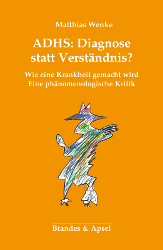ADHD: Diagnosis instead of understanding?
The ADHD madness does not end, furthermore approx. 10 per cent of the primary school children in Germany, above all boys, get medicines.
The critical opposition to the "ADHD"-diagnosis is scientifically confirmed more and more. The reductionistic and biologistic explanation proved as expected as outdated and the phenomenological, holistic view of spirit, body and world was confirmed.

The quasipsychiatric diagnosis "ADHD" ...
... turns out to be an instrument for the biologization and individualization of the consequences of psychosocial processes. It serves the participants to keep children's disturbing behaviour away from them and to build up the fiction of a scientific explanation: It is better to have brain patients than unhappy children.
This is why you read "a very clever and important book, which throws a new perspective on the subject of ADHD, especially the consequences of excluding diagnoses unmistakably clear" (special education). Thus the volume has a large meaning for a critical examination of the development around ADHS (Ev. Jugendhilfe).
The book is both a critical analysis of the ADHD discourse and a basic work. On the one hand it showed the dangers and blind spots of biologism in the human image of medicine, psychiatry and psychology from an individual psychological and phenomenological point of view.
On the other hand, it fills a theoretical gap by systematically opening up body phenomenology as the basis of a life-worldly, existential psychology, e.g. for curative education or psychoanalysis.
Matthias Wenke, M. A. Educational Science, Psychology, Sociology. Individual psychological consultant and supervisor (DGIP).
Links to the book: www.buecher.de, www.amazon.de
Source: Press release of the author Matthias Wenke
Homepage of the author: www.mwenke.de
----
[This is a translation of the German original article: ADHS: Diagnose statt Verständnis?]
- Details
- Erstellt am 06.10.2019
- Geschrieben von Diana Saft
